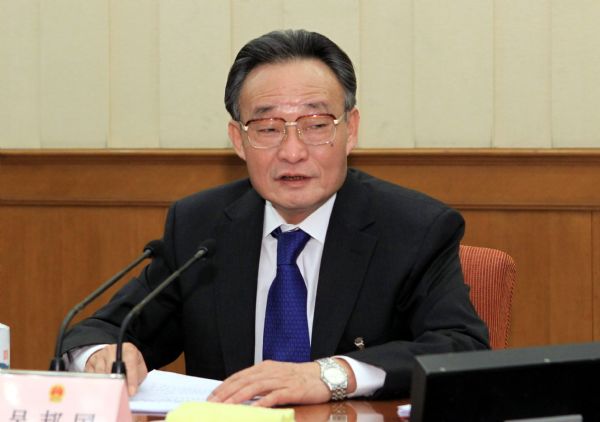China adopts car tax law to promote energy conservation
 |
| Wu Bangguo, chairman of the Standing Committee of the National People's Congress (NPC), presides over the closing meeting of the 19th session of the Standing Committee of the 11th NPC in Beijing, capital of China, Feb. 25, 2011. [Xinhua/Fan Rujun] |
China's top legislature voted on Friday to adopt a law for vehicle and vessel taxation, which aims to encourage the use of smaller engines in vehicles and vessels to reduce pollution and oil dependence. The law will go into effect on January 1, 2012.
China is currently the world's largest auto manufacturer as well as the largest auto market. Recent statistics show that China has 199 million motor vehicles on the road.
The law intends to tax cars according to engine size. Under the old regulations, the same levy was charged for all motor vehicles, regardless of engine capacities.
The annual taxes on vehicles and vessels range from 60 yuan to 5400 yuan, according to engine size as stipulated by the new law. Under the old regulations, the tax ranged from 360 yuan to 660 yuan.
Bai Jingming, the deputy director of the Research Institute for Fiscal Science under the Ministry of Finance, said that the tax differences could provide an incentive for car consumers to pick cars with smaller engine capacities to conserve energy.
Hotly-debated law
The draft law on vehicle and vessel taxation was submitted to the Standing Committee of the National People's Congress (NPC), China's top legislature, in October 2010 for a first reading. According to the first draft, only taxes on vehicles with an engine capacity smaller than 1.0 were reduced. For most Chinese car owners, they need to pay more car taxes every year.
The draft law was released in full to the public to solicit opinions. From October 28 to November 30 last year, China's top legislature received nearly 100,000 suggestions about the draft law. About 54.6 percent of the respondents asked for the reduction of the tax burden.
The second draft of the law, which was submitted to China's legislature for review on February 23, made significant tax adjustments based on suggestions from the public. According to the second draft, taxes on vehicles with engine capacities from 1.0 liter to 1.6 liters dropped from 360-660 yuan to 300-540 yuan. Meanwhile, taxes on vehicles with engine capacities of 1.6 liters to 2.0 liters dropped from 660-960 yuan to 360-660 yuan.
This means that the tax burden for owners of vehicles with engine capacities of 2.0 liters or below will not be increased from the current rate.
In China, 87 percent of cars on the road have engine capacities of 2.0 liters or below. Fang Xin, member of the NPC Standing Committee, said that the revision in the final draft of the law incorporated suggestions and opinions from all citizens and ensured that the tax burden for most car owners will not be increased.
 0
0 







Go to Forum >>0 Comments